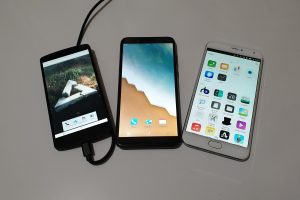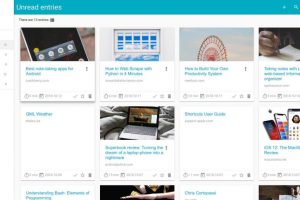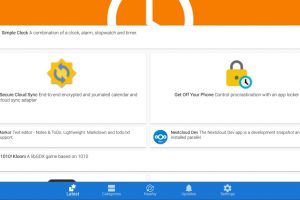What Linux or open source geek has never dreamed of being able to access their beloved computer from anywhere? And no, not just through a remote command line shell. Ever since phones have become more than just communication devices and veritable computers in our pockets, the dream of a Linux smartphone and a portable Linux computer may have been in many users’ minds and hearts. From Nokia’s Debian-based Internet tablets and N900 phone to Ubuntu’s discontinued Ubuntu Touch Convergence, that dream has never been completely fulfilled. Samsung’s Linux on DeX, still in beta, arguably has the biggest chance to deliver that. That
What is it for?
For those unfamiliar with the things that Samsung has been cooking up in the Android world, Linux on Dex is an extension of Samsung’s DeX technology that practically presents Android in a desktop-like interface when a compatible phone is connected to an external display (via a dock or directly), complete with panel and floating windows. It’ss the Android desktop that a few companies and developers have been trying to achieve, all with varying degrees of success.
Linux on DeX then runs Linux on top of that. Almost literally on top, as LoD practically runs as a fullscreen Android app in DeX (desktop) mode. Under the hood, it’s really just a Linux container running Ubuntu 16.04 that has been slightly modified to run on an Android smartphone, using VNC for a full GUI desktop, which normally requires DeX mode, and SSH for “headless” access directly on the phone, even without an external display.

To be clear, Samsung isn’t really trying to appeal to Linux users the way Ubuntu Touch and its Convergence did. That would be great but Samsung is naturally more interested in its own ecosystem and, ultimately, in profits. Linux on DeX is merely a tool towards that end. In particular, it’s a tool to help app developers craft Android apps using nothing but their Galaxy phone or tablet. It sort of lowers the barrier to entry (if you don’t count the uber expensive devices themselves) by not requiring a separate PC to develop apps with. In all honesty, though, if Samsung could have gotten Windows to offer the same experience for absolutely free, it would have probably gone that route.
Smooth as butter. Almost.
Linux on DeX is hardly the only attempt at running Linux on Android, though admittedly there are fewer projects that attempt to run a graphical Linux desktop on Android. What sets LoD apart, aside from its limitation to Samsung devices, is its ease of setup. Once you get into the beta and beta program, simply install the Android app, follow the instructions to download the official (and large) Linux image, create a container for it with the desired name and data storage size, and just run it.
You get a working and usable Ubuntu GNOME desktop (or shell) and almost everything you know about Linux, specifically Debian-based distros like Ubuntu, applies. There are a few caveats particular to the way it’s running inside a phone (like fixed display resolutions, missing options, etc) but most Linux users, even less advanced ones, will be able to navigate their way around LoD.

Performance is admittedly impressive. Most of the “Linux on Android” implementations I’ve tried, both root-based and otherwise, often groan under the weight of running anything graphical, let alone a full GUI desktop. It helps that Samsung’s hardware requirements for Linux on DeX is pretty high and expensive, only the Galaxy Note 9 and Galaxy Tab S4 are officially supported. Still, aside from a few stuttering when you’re running processor and graphics intensive tasks, it’s almost unbelievable that you’re running a “normal” Linux desktop over a few layers of abstraction on a smartphone. The external monitor, keyboard, and mouse definitely help reinforce that illusion.
What can you do with this Linux on DeX? Honestly almost anything you can do with a regular Ubuntu system. The biggest limitation is, however, the packages available for the ARM64 (arch64) architecture. While Ubuntu/Debian has a wide selection of LInux software, not all of them are built for all architectures, even including the popular ARM. That’s even more true for third-party software sources, including Dropbox and Google Chrome, neither of which officially support ARM yet. Fortunately, Chromium is around and there are some guides on how to get Dropbox working on ARM, at least via Raspberry Pi tutorials. And, being Linux, you can always compile software that you need. Presuming the phone can take heat.

What you can and cannot do
With that caveat aside, you can still do a lot of things with LoD. You can switch your desktop environment of choice (HINT: edit ~/.vnc/xstartup to change what gets run when LoD is started graphically). You can run almost any GUI or command line software you wish (provided they’re available for Ubuntu 16.04). You can even run Blender, though don’t expect to do any significant modeling and rendering here. And, of course, you can run your favorite software development tools to write apps for Android or Samsung’s Galaxy phones.
At the moment, however, beta testers seem to be stuck at the Xenial Xerus 16.04 LTE, as any attempt at upgrading to the current LTE version 18.04 Bionic Beaver, results in a broken container. So while they are free to do whatever they want inside that container, they are, in effect, confined to that specific container.

In fact, Linux on DeX currently only supports that particular distribution and that specific version of that distribution alone. If you’re not a fan of Ubuntu or simply prefer a more familiar distro, you’re pretty much out of luck. Not only that, you’d have to bend over backwards and make no small amount of compromises and tricks to even use anything other than Samsung’s custom VNC client and connection.
Almost there, but not quite
With Linux on DeX, Samsung has come closest to achieving that “phone as a desktop” dream that the likes of Microsoft, Canonical, and other tech evangelists have tried to achieve. Even in its beta form, its performance and execution is, to be honest, is surprisingly good. But to an open source advocate, it might fail to completely impress.

Linux on DeX is pretty much a huge walled garden. It’s big enough that you can roam almost freely yet still gated and almost proprietary to Samsung. Linux users who are too used to the freedom and choices offered by the open source operating system, LoD can even feel a tad suffocating. It does, however, demonstrate the good things Samsung can pull off when it put its mind to it. Hopefully it won’t quickly change its mind as it has its other experimental endeavors.





